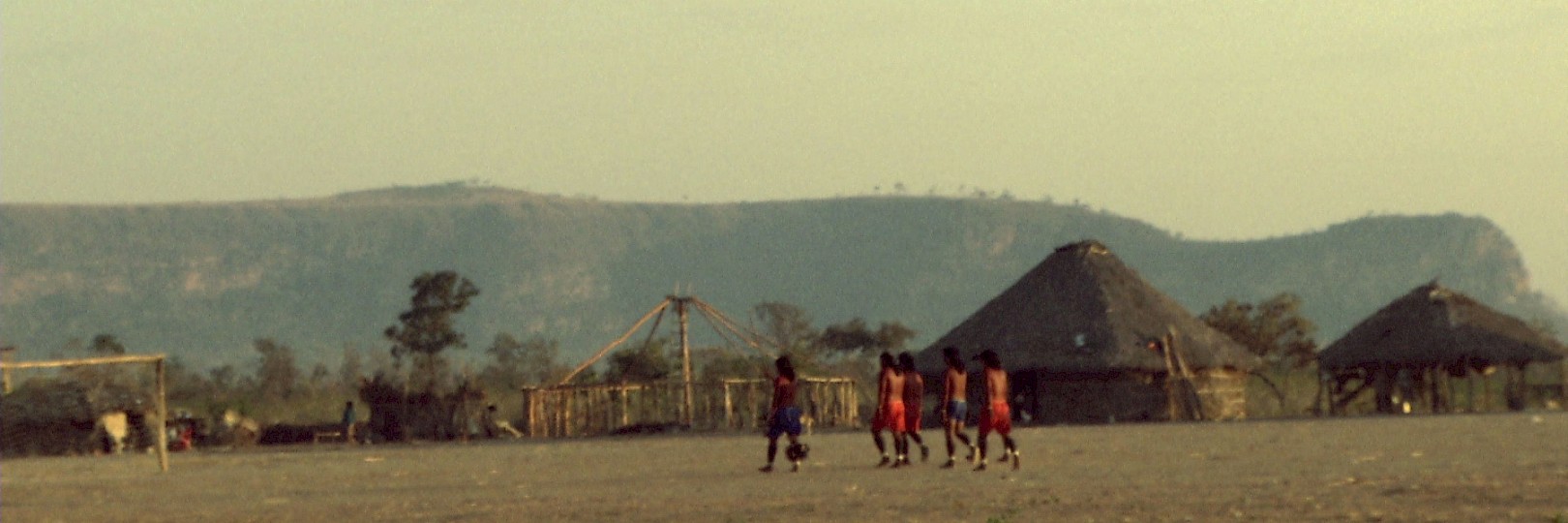Povo Xavante
42:05
The Xavante people. Wai'á ritual. Pimentel Barbosa Indigenous lands. Roncador mountain range. Canarana. Mato Grosso state. 210 people in the village
The Xavante People
A lake filled with transparent waters but no living creature in sight. A crystal rock over a hundred feet wide. A people preparing to dream at night and make those dreams come true. A deep sound drawing onto the mountain range, one of the most unknown in all of South America: the Roncador mountain range of five hundred miles separating rivers and defining routes between Brazilian states
“The Roncador mountain range is a place for the integration of intraterrestrial, physical, and superphysical realities”
Indigenist Alexandre Lemos
Earth’s chakra, a healing portal, a passage to paradise… The Roncador mountain range serves as a backdrop for many stories about faith, magic, and mystery. An address for “real people”, as translated from the original name of the Xavante people: approximately thirteen thousand Indians speaking Akuen, a language from the Macro-Jê linguistic tree, organized in a complex social network, cultivating a pulsing culture that integrates biodiversity and ancient traditional knowledge.

This region in the heart of the Brazilian cerrado has two well-defined seasons: the drought or winter from April to October, and the rainy season or summer during the remainder of the year. The Xavantes are organized into two clans and perform weddings between them. Chores are divided by gender, so women are responsible for preparing the farmland and fruit-picking, whereas men are responsible for hunting and fishing, an activity that plays an important role in this people’s rituals.
In the Xavante universe, women are nature and men are culture. Men are the strict guardians of the Roncador mountain range and its mysteries. For their latent power of life and gestation, women are not allowed in rituals requiring discipline and rigor: these are moments for connecting with ancestors and spirits, for preparing the youth for a life of conscientious contact with the intraterrestrial, extraterrestrial, and spiritual worlds.
“There’s a limit to what one can transmit and what one can keep in their hearts, as I’ve learned from the Xavantes guarding the entryway to the mountain range"
Indigenist Alexandre Lemos
Wai’á is the most important male ritual, a series of dreamed up chants, ceremonies that respect and interact with the spiritual world, in which a pact of diplomacy between the Xavantes and their gods is renewed. During the drought, from July through August, adult men prepare for the ceremony with artifacts found in the cerrado.

The Xavante men, serving as portals for the communication with the invisible during the ceremonies, abstain from food, water, and sexual relations. They must walk days on end under the burning sun, since it is physical and emotional strength that open the channels for spiritual connections and trance. The sounds of feet on the ground and leaf showers make for better dreaming: and dreams are essential for they belong in the realm of sacred things.
“The Xavante dream to bring their desires into reality”
Indigenist Alexandre Lemos
In the youth preparation, which finishes in the confinement house, the main purpose is the readying and uncovering of healers with the power of curing diseases, animal stings, rain, and lightning. Older Indians, the ceremony’s guardians, observe the rituals with vigilant eyes, assessing the discipline and performance of the young ones. In dreams, they discover objects hidden by spirits all over the cerrado.
Every ten or fifteen years, a longer ceremony takes place: the Wai´árini strengthens and prepare the men for the annual Wai’á, when healers shake the rattle to perform their dreamed up songs. Food is presented in appreciation of the lessons learned and as a bonding opportunity for all involved.

In the Pimentel Barbosa Indigenous lands, cacique José Tserenhomo – Sumené Xavante – rekindles the boys’ dreams in the company of elders Waraci, Bau, Manoel Morais, and Tseredzu: it is the wisemen, like the sister jungle, that have a role in teaching the young ones how to awaken with closed eyes. Together, in a darkness that is appreciated instead of feared, they find cures and words and paths. Everything they need, they already know, it lies within that which can be sensed but not always seen… in the movement of bodies made for exhaustion.
Nights of dreaming followed by sweat on skin: the Xavante prescription to connect material and sacred. The trance comes with the sun: a sign that sounds that matter have been relinked. The singing, therefore, can come to an end.
(The indigenist and cultural producer Alexandre Lemos has shared his time with the Xavante people for over six years as an indigenist and a liaison for ethnodevelopment projects)

interview
Betty Midlin
04:55
